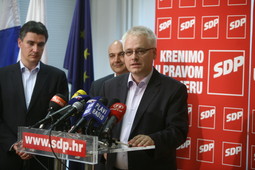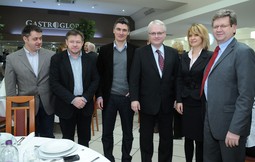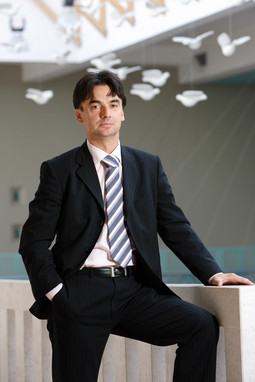Published in Nacional number 746, 2010-03-02
Political report
SDP divided over Josipovic and Milanovic
A STRONG GROUP within the SDP does not approve of the work of Ivo Josipovic and by doing so are opposing his backer, Zoran Milanovic
 IVO JOSIPOVIC and Zoran Milanovic are coming under fire within the party because they have allegedly deviated from the party's social democratic values, which according to critics, were better articulated by Ljubo Jurcic
There is a strong group within the ranks of the Croatian Social Democratic Party that is unhappy with the new President of the Republic, Ivo Josipovic, as well as with their party leader Zoran Milanovic. Stated briefly, over the past ten days Josipovic has been accused of betraying the SDP and social democratic principles, while they accuse Milanovic of doing nothing to strengthen the SDP's influence in the President's Office. This information was published by the media some ten days ago, and was confirmed for Nacional this past week by a long time member of the SDP and Member of Parliament.
IVO JOSIPOVIC and Zoran Milanovic are coming under fire within the party because they have allegedly deviated from the party's social democratic values, which according to critics, were better articulated by Ljubo Jurcic
There is a strong group within the ranks of the Croatian Social Democratic Party that is unhappy with the new President of the Republic, Ivo Josipovic, as well as with their party leader Zoran Milanovic. Stated briefly, over the past ten days Josipovic has been accused of betraying the SDP and social democratic principles, while they accuse Milanovic of doing nothing to strengthen the SDP's influence in the President's Office. This information was published by the media some ten days ago, and was confirmed for Nacional this past week by a long time member of the SDP and Member of Parliament.
On the other hand Milanovic and his associates have rejected these accusations, verbally backing their work and methods to date. This confirms that within the largest opposition party there exists a conflict with regard to Ivo Josipovic, who was until recently their party colleague. But when the criticisms of Josipovic and Milanovic are analysed it becomes clear that the SDP is not an ideologically homogenous party. On the contrary, the differences with regard to the concept and political direction that should be followed in the future are becoming greater and more pronounced. On the one side there is the party "establishment" which advocates a liberal-market model, and by this alone, a strong step away from the fundamental principles of the left, such as guaranteed employment and union rights, while the dominant stance in the SDP's rank and file is to advocate the traditional leftist concept.
The first personnel decisions taken by Josipovic set off a much deeper conflict that has simmered within the SDP for some time now. President Ivo Josipovic's decision to appoint to his team of economic advisors leading Croatian businessmen and representatives of "big money" has been seen as a kind of betrayal of the SDP - the party that put him forth as a presidential candidate and played a decisive role in his victory at the elections. The criticisms against Ivo Josipovic simultaneously apply to Zoran Milanovic, and could be a precursor to a strong ideological confrontation within the SDP.
Put mildly, within the Social Democratic Party they feel that the new Croatian president, upon assuming office, betrayed his former party, and instead of supporting the SDP, is attempting to create a new centre of political decision-making. As a result, a group of influential members of the SDP see Ivo Josipovic as a foreign body within social democracy. The antagonism towards Josipovic was set off by his team of economic advisors, which according to Nacional's source, is comprised of people that are at complete odds with the SDP's economic ideas. Besides this, it is also clear that through this group Josipovic is creating a third power structure in the country.
"He doesn't care about the SDP now that he's finished using it," is their fundamental criticism. Simultaneously harsh accusations are being levelled, including one that states that Josipovic's "third centre of power" (along with the governing coalition and the opposition parties) is actually a team of conspirators, pushed forward with the assistance of the media within Europapress holding, which is fundamentally at odds with the SDP's program. It bears reminding that it was precisely the EPH's publications that first supported Josipovic. This is now cited within the SDP as proof of a "conspiracy".
The roots, however, are much deeper. Josipovic's profile and the entire history of his relationship with the SDP is now being viewed within the stated context. Nacional's source believes that Josipovic never organically belonged to the party, but rather joined the party when he calculated that he could profit from it. In this sense he was assisted by Ivica Racan, despite the fact that initially Racan did not have a particularly close relationship with Josipovic. The next category of criticism against the new President of the Republic concerns his personal fortune. It is interesting that in this context this SDP group is using arguments that were used in the pseudo-intelligence material that was circulated in the recent election campaign. It is asserted that Josipovic is a rich man, who profited greatly from royalties collected by ZAMP, and that the people he appointed to his team of economic advisors are his "natural surrounding."
They are, according to the source, "the caste of the primary winners of the privatization process," and not some Herzegovinians given to malversation, who secured quick profits by serving Tudjman. They are refined and sophisticated profiteers, who have acquired a large capital base in ways that cannot be directly incriminated, and want now on the basis of this to determine the country's economic policy. Josipovic works for them. President Josipovic is also accused of having once launching an initiative for the broadening of financial compensation for copyrights to libraries, i.e. the borrowing of books, and even on the purchase of blank discs, because some form of music will be recorded on them.
His critics within the SDP say that this was all a front for broadening control over the entertainment business. Everything that people listen to, be it on the radio, television, or in any establishment, must be paid for, and it must be paid to ZAMP, an institution in which he has the final word. In the SDP today, they like to call him the "copyright tycoon". Through his team of economic advisors, Nacional's source feels that Josipovic has now publicly linked himself to people close to him.
And this is what has led to a fundamental conflict within the SDP, which by definition does not accept these people or their concepts. Particularly suspect is his relationship with Adriatica.net and Marko Vojkovic, with whom he allegedly has business ties. Zoran Milanovic also allegedly has interests close to that group. Nacional's source claims that the recent effort to save Adriatica.net is the product of an operation led by a group of tycoons close to Josipovic. Within this part of the SDP the prevailing sentiment is that the economic ideas of Ljubo Jurcic were incomparably more compatible with their social democratic program.
In presenting the SDP's economic platform Jurcic put the emphasis on introducing capital gains and property taxes, instead of additional income taxation. This led to a campaign against Jurcic, and one of the more scathing accusations against Josipovic is that the people behind this campaign were the tycoons that he has now appointed as his advisors. This group felt that Jurcic's proposals would drastically threaten their interests, and that Josipovic must therefore be nominated as the SDP's presidential candidate, whatever the cost. As is well known, the SDP's primaries to determine who would be nominated as the party's presidential candidate were based on the "one person - one vote" system, with Ivo Josipovic securing the nomination after gathering close to 65 percent of the vote.
 JOSIPOVIC'S COLLABORATORS Igor Dragovan, Ivo Jelusic, Zoran Milanovic, Ivo Josipovic, Milanka Opacic and Mirando Mrsic – close associates of President Josipovic, who is coming under fire from his former party
There was a group of prominent member within the party who were not convinced of his ultimate victory at the presidential elections, and dedicated themselves to generating support for Zlatko Komadina, Ljubo Jurcic, and to a lesser degree even for Milan Bandic. A great deal of the credit for Josipovic's victory at the party primaries has to go to Milanovic, who energetically lobbied within the party on Josipovic's behalf. This is one of the reasons why they hold Milanovic's SDP responsible for this situation. They claim that Zoran Milanovic is not in control of the situation, that vanity dictates his method of leadership, given that he occupies himself exclusively with personnel changes, and rarely appears in Parliament. Regarding the relationship between the party and Josipovic, Milanovic has tried to neutralise and mitigate matters.
JOSIPOVIC'S COLLABORATORS Igor Dragovan, Ivo Jelusic, Zoran Milanovic, Ivo Josipovic, Milanka Opacic and Mirando Mrsic – close associates of President Josipovic, who is coming under fire from his former party
There was a group of prominent member within the party who were not convinced of his ultimate victory at the presidential elections, and dedicated themselves to generating support for Zlatko Komadina, Ljubo Jurcic, and to a lesser degree even for Milan Bandic. A great deal of the credit for Josipovic's victory at the party primaries has to go to Milanovic, who energetically lobbied within the party on Josipovic's behalf. This is one of the reasons why they hold Milanovic's SDP responsible for this situation. They claim that Zoran Milanovic is not in control of the situation, that vanity dictates his method of leadership, given that he occupies himself exclusively with personnel changes, and rarely appears in Parliament. Regarding the relationship between the party and Josipovic, Milanovic has tried to neutralise and mitigate matters.
There is, however, discontent within the SDP, because Milanovic did not influence Josipovic, specifically with regard to the selection of the President's team of economic advisors. Nacional's source says that there are no prominent members in the Social Democratic Party that would for Josipovic and his team of economic advisors, and sooner or later this must come to a head. There are no pro and contra fractions because no one agrees with Josipovic.
"Milanovic will have to do something, he will have to commit himself somehow, because things are going in a direction that will inevitably leave the president of the party at odds with the fundamental disposition of the party," says this member of the party leadership. The criticisms of the SDP president do not stop there. Despite a strong opposition to the economic policy being implemented by Jadranka Kosor and the HDZ government, within a part of the SDP there is a feeling that the current crisis calls for a national consensus on fundamental issues. Slavko Linic hinted at this a few months ago when he said that he would give Government until September to bring the country out of the recession. Only if there were no visible moves forward in the economy by the autumn would the SDP start criticising the work of Government, and call for early elections. A similar proposal can also be heard from the part of the SDP that is critical of Milanovic and his very inflexible stance towards Jadranka Kosor and the HDZ.
"Milanovic must come to realise that on the issue of basic state and economic programs, which is a key element, he must achieve an agreement with the HDZ," says Nacional's source. Proof that some of this has to do with a personal animosity towards Milanovic, is the fact that the question of the legitimacy of the mortgage with which he purchased a new apartment in downtown Zagreb a year ago is being raised from within the SDP. It is being mentioned that he acquired the apartment under conditions as equally suspicious as the conditions under which Jadranka Kosor acquired her apartment, and that in fact he does not have any "moral advantage" over the HDZ, even though he enjoys presenting himself as a great moralist.
In the context of the internal conflict among leading SDP officials, the election coalition with the Kastav group is also being brought into question. The understanding that the SDP can lose more than it can gain with the coalition is beginning to gain ground. Even more so since the HNS and IDS assumed an unfair position during the presidential elections, putting forth their own candidates, Vesna Pusic and Damir Kajin respectively, even though it was clear that neither had any real chance of winning the poll. Zoran Milanovic rejects these criticisms, and a close colleague feels that the people in question are those within the SDP that were hoping they would be called upon by Ivo Josipovic and included among his team of advisors. Apparently they are now disappointed and wish to draw the SDP and Josipovic into conflict.
A part of that statement is true, but the core of the most recent conflict should be sought in the deep differences that exist within the SDP. It is possible to divide them into two groups that could in the future evoke strong political turmoil among the social democrats. Firstly it is an ideological conflict that has been evoked by the SDP's new economic strategy proposal, which includes numerous neoliberal measures. The strategy was penned by Branko Grcic, a Member of Parliament and the dean of the graduate School of Economics in Split, who recently told Nacional that Croatia must renounce social democracy over the next couple of years and first financially consolidate itself. Grcic is the first SDP official to publicly propose a turnaround towards a liberal economy, and by doing so - as would be expected - gained a number of critics within the SDP. Given that he enjoys Milanovic's support in principle, logic dictates that the SDP president must also come under fire. Ivo Josipovic's team of economic advisors advocate an economic policy very similar to the concepts put forward by Grcic, and this is why they are coming under fire from those belonging to the traditional social democratic faction.
 THE SDP'S ECONOMIC PROGRAM, which was drawn up by Branko Grcic, has also become a point of division within the party, because it includes neoliberal measuresSecondly, Sunday's elections for the head of the Split branch of the SDP, in which Ranko Ostojic lost to Marin Jurjevic, was de facto a defeat for Zoran Milanovic. Despite factual data which confirm that since 2007 he has lost every election in which he has participated (parliamentary, for Split mayor and now for the top post in the SDP's Split branch), Ostojic is among Milanovic's key players, and if the SDP were to assume government, he would have an important role within the administration. Jurjevic's win however, shows that the majority of the SDP's members are opposed to the policy of co-opting trusted friends to leading positions, and preferred therefore to elect a person who is effectively in political semi-retirement, rather than a candidate that the party president supports. Should Zeljka Antunovic win in Zagreb, something she has a good prospect of doing against the politically and professionally drab Milanovic candidate Ivo Jelusic, the SDP branches in the countries two largest cities will be controlled by people who are opposed to Zoran Milanovic.
THE SDP'S ECONOMIC PROGRAM, which was drawn up by Branko Grcic, has also become a point of division within the party, because it includes neoliberal measuresSecondly, Sunday's elections for the head of the Split branch of the SDP, in which Ranko Ostojic lost to Marin Jurjevic, was de facto a defeat for Zoran Milanovic. Despite factual data which confirm that since 2007 he has lost every election in which he has participated (parliamentary, for Split mayor and now for the top post in the SDP's Split branch), Ostojic is among Milanovic's key players, and if the SDP were to assume government, he would have an important role within the administration. Jurjevic's win however, shows that the majority of the SDP's members are opposed to the policy of co-opting trusted friends to leading positions, and preferred therefore to elect a person who is effectively in political semi-retirement, rather than a candidate that the party president supports. Should Zeljka Antunovic win in Zagreb, something she has a good prospect of doing against the politically and professionally drab Milanovic candidate Ivo Jelusic, the SDP branches in the countries two largest cities will be controlled by people who are opposed to Zoran Milanovic.
This does not mean that one should expect a schism within the SDP, but in that case the position of the group that is opposed to Zoran Milanovic and Ivo Josipovic will be considerably strengthened. For now their criticism of the President of the Republic and the president of the SDP remains clandestine, but their dissatisfaction could soon come to the forefront.
Related articles
Sanader’s eight fear SDP — Won’t bring down Government
Despite forecasts that he would, former Croatian Prime Minister Ivo Sanader, who recently took his seat in Parliament, will not work from the house… Više
Latest news
-
28.10.2010. / 14:15
'A profitable INA is in everyone's interest'
-
28.10.2010. / 09:38
Sanader’s eight fear SDP — Won’t bring down Government
-
21.10.2010. / 15:02
Interior Ministry turned a blind eye on Pukanic assassination
-
20.10.2010. / 09:34
Barisic could bankrupt HDZ




